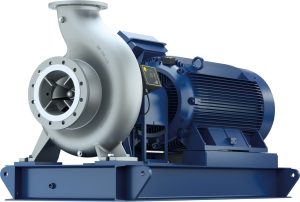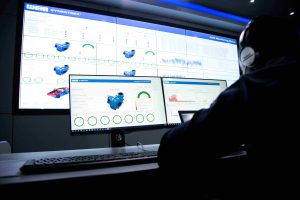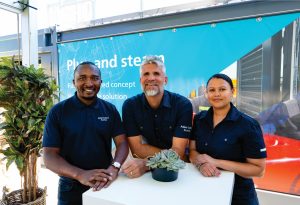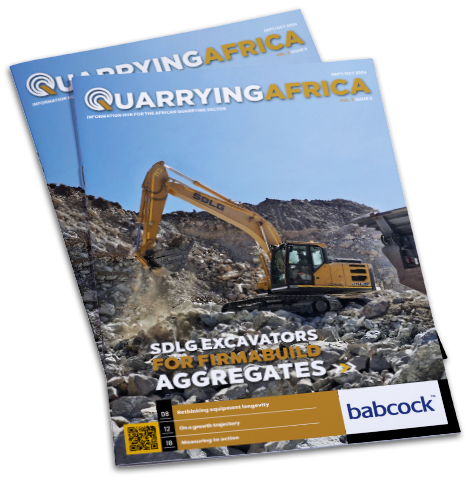Afrimat has today released full year results for the year ended 28 February 2022, with revenue up 26,7% to R4,7-billion (2021: R3,7-billion).
Group CEO Andries van Heerden says Afrimat delivered robust results on the back of favourable iron ore prices, the expeditious turnaround of Nkomati Anthracite mine (Nkomati), the establishment of the Jenkins mine, and the return to pre-Covid-19 volumes in the Construction Materials and Industrial Minerals segments, all of which translated into strong operating cash flows.
He comments that the group’s solid track record of augmenting acquisitions as part of its diversification strategy, and cost management and efficiency improvement initiatives, enabled it to continue delivering good growth. He adds that future growth, sustainability and access to exciting new products and markets are enhanced by new long-life projects such as the recently announced Glenover phosphate, rare earth minerals and vermiculite project and the Gravenhage manganese mine.
“The latter is due to contribute to the 2024 financial year, while Driehoekspan and Doornpan are iron ore reserves that will come online in the future to ensure the sustainability of our iron ore export business.”
Financial results
Revenue as reported improved primarily due to increases in volumes as well as attractive iron ore pricing. This translated into an operating profit increase of 25,1% from the previously reported operating profit of R886,3-million to R1,11-billion.
An overall operating profit margin of 23,7% was attained compared to 24% in the previous year, with headline earnings per share increasing by 22,9% from 441,7 cents to 542,9 cents.
Net cash from operating activities remained strong, whilst the net debt:equity ratio continued to be very low, increasing from 3,8% to 12,1% because of the acquisition of Coza Mining Proprietary Limited, the Glenover transaction, and capital funding for the Nkomati and Jenkins mining assets.
A final dividend of 146,0 cents per share for the year (2021: 112,0 cents per share) was declared, bringing the total dividend for the year to 186,0 cents per share (2021: 148,0 cents per share).
Operational review
Van Heerden says that all operating units remain strategically positioned to deliver outstanding service to customers, whilst acting as an efficient hedge against volatile local business conditions given the product diversification they represent.
The Bulk Commodities segment, consisting of the Demaneng and Jenkins iron ore mines, and the Nkomati anthracite mine, benefited from the successful turnaround of Nkomati and favourable iron ore pricing. The segment contributed 74% to the group operating profit.
“This excellent performance was further enhanced by increased volumes from the Jenkins mine,” says Van Heerden, adding that additional volumes contributed positively to the second half of the financial year. Van Heerden went on to add that the ramp up is in accordance with strategic plans and product is being sold into the local market through a defined price and volume contract.
“Nkomati, which produces a high-quality product for the local market, was loss making for the first five months of the reporting period, but turned into a profitable business from August 2021 onwards, recovering the biggest part of the losses of the first five months.”
The long-term sustainable life of mine plan is being enhanced through the opening of two opencast pits and work has begun on opening the underground operations.
The Industrial Minerals businesses delivered returns comparable to pre-Covid-19 volumes across all regions, delivering an increase in operating profit of 70,2% from R55,5-million to R94,4-million. The acquisition of the feed lime business (Agri Lime) strengthened Afrimat’s footprint in the agricultural lime market in support of deeper diversification in this segment.
Similarly, the Construction Materials segment experienced a return to pre-Covid-19 volumes, resulting in a significant improvement in operating profit of 83,5% from R104,9-million to R192,5-million in the year under review. “This is primarily a result of general volumes recuperating to 2019 levels, rather than a result of a rise in construction activity, as well as a strong focus on operational efficiencies,” adds Van Heerden.
Expansion projects key to enduring future success
Although the acquisition of the Glenover phosphate stockpiles is included in these results, they have not yet contributed to group profits
Van Heerden explains that the Glenover acquisition, which includes phosphate stockpiles, rare earth and a vermiculite mining right, positions Afrimat to enter new commodities for further diversification and sustainability. “Sales of raw phosphate have begun, with these revenues being reported on in future periods. Substantial progress has also been made on the follow up phases of this project, which positions Afrimat in specialised commodity extraction through the metallurgical processing of the resource.”
Regarding Gravenhage, the manganese project in the Northern Cape, Afrimat is still waiting for approval of the water use license which, once received, would trigger a payment in ZAR equivalent to US$30-million. This project is only expected to contribute to the financial results in the 2024 financial year.
People central to continued sustainability
Good labour relations were maintained during the financial year, with no labour action or significant community action having occurred, reports van Heerden. “The Group is committed to creating and sustaining harmonious relationships in the workplace and to addressing issues proactively. We continue to prioritise staff development, training and education on the human capital agenda.”
More than 500 jobs were created, taking total employees to over 2 500. “With training and development being a critical part of the Group, a total of 10 000 training days for employees were undertaken during the year, supplemented by the issuance of 56 staff bursaries.”
Afrimat has 45 mining rights in place and has a specialised team to liaise with the respective governing bodies, including the Department of Mineral Resources and Energy, Department of Water and Sanitation and the Department of Environmental Affairs.
New business development also remains a key component of the group’s growth strategy, with van Heerden saying that this dedicated division continues to successfully identify and pursue opportunities in existing markets, as well as in anticipated new high growth areas. “The success of this division has led to the establishment of a team to focus purely on future minerals where a pipeline of projects and commodities is being built.”
Looking ahead
Van Heerden said that the Group is well positioned to capitalise on strategic initiatives and future opportunities. “Our future growth will continue to be driven by the successful execution of our proven strategy, recent acquisitions and a wider product offering to the market, with several exciting opportunities being investigated.”
He adds that planning for future growth would continue to be supported by acquisitions that conform to a unique competitive advantage depending on geographic location, unique metallurgy and structural cost advantage. “Of course, operational efficiency initiatives aimed at expanding volumes, reducing costs and developing the required skill levels across all employees, remain a key focus in all operations.”
In closing, Van Heerden says that Afrimat will continue to strive to ensure a healthy and sustainable strategic positioning, to execute well on the assets it adds, to diligently control capital allocation and continue to ensure optimal cash generation, all the while ensuring a strong commitment to its people and the communities it operates in.
“Most important of all perhaps though is our desire to uphold ESG fundamentals and consciously work on all stakeholder relationships. We do all this daily because it is entrenched in our culture to ensure returns that support long-term sustainability.”





